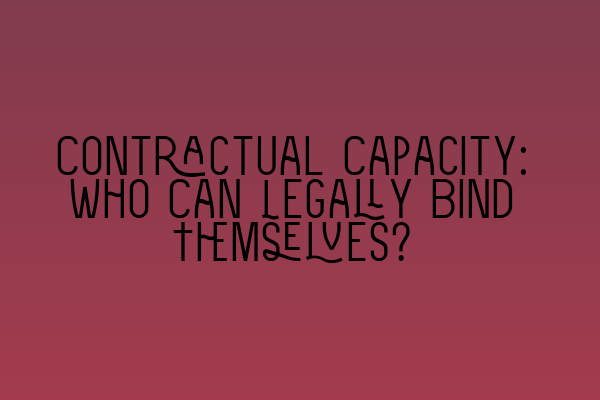Contractual Capacity: Who Can Legally Bind Themselves?
When entering into a contract, it is vital to ensure that all parties involved have the legal capacity to bind themselves to the terms and obligations. Contractual capacity refers to the legal ability of an individual to understand the nature and consequences of a contract and to be held legally responsible for its fulfillment.
In this article, we will explore the concept of contractual capacity and discuss who can legally bind themselves. Understanding this fundamental aspect of contract law is crucial for both solicitors and individuals entering into contractual agreements.
What is Contractual Capacity?
Contractual capacity is the legal ability of a person to enter into a contract. It is a fundamental principle of contract law that parties must have the necessary mental capacity and legal status to be bound by the terms of an agreement. If an individual lacks the capacity to contract, the contract may be considered void or voidable.
The law recognizes that not everyone has the same ability to understand and consent to legally binding agreements. Certain individuals, such as minors, individuals with mental disabilities, and those under the influence of drugs or alcohol, may have limited or no capacity to enter into contracts.
Who Can Legally Bind Themselves?
1. Adults: In general, adults who are of sound mind have the legal capacity to enter into contracts. These individuals are assumed to have the necessary ability to understand the terms and consequences of the agreement. However, it is important to note that specific circumstances, such as undue influence or fraud, can render a contract voidable even for adults.
2. Minors: Minors, individuals who are under the age of majority (usually 18 years old), have limited capacity to enter into contracts. Contracts entered into by minors are generally voidable at the option of the minor. However, some contracts, such as those for necessities like food, clothing, and shelter, may be enforceable against minors.
3. Individuals with Mental Disabilities: Individuals who are deemed mentally incapacitated or have been diagnosed with a mental disability may have limited or no capacity to enter into contracts. The law recognizes the need to protect these individuals from exploitation and unfair contractual obligations. In such cases, a court may appoint a legal guardian or authorize the individual’s representative to enter into contracts on their behalf.
4. Intoxicated Persons: Contracts entered into by individuals who are under the influence of drugs or alcohol may be voidable if their intoxication impairs their ability to understand the nature and consequences of the agreement. However, it is worth noting that the degree of impairment required to render a contract voidable can vary based on jurisdiction and individual circumstances.
Conclusion
Contractual capacity is a fundamental aspect of contract law that ensures fairness and protection for all parties involved. Understanding who can legally bind themselves is crucial when negotiating and drafting contractual agreements. As a solicitor, it is your responsibility to assess the capacity of your clients and advise them accordingly to ensure the validity and enforceability of contracts.
If you are preparing for the SQE 1 or SQE 2 exam and want to test your knowledge, check out our SQE 1 Practice Exam Questions or SQE 1 Practice Mocks FLK1 FLK2. We also offer comprehensive SQE 2 Preparation Courses and SQE 1 Preparation Courses to help you succeed in your exams. Stay updated with the latest SRA SQE Exam Dates and take your career to new heights.
